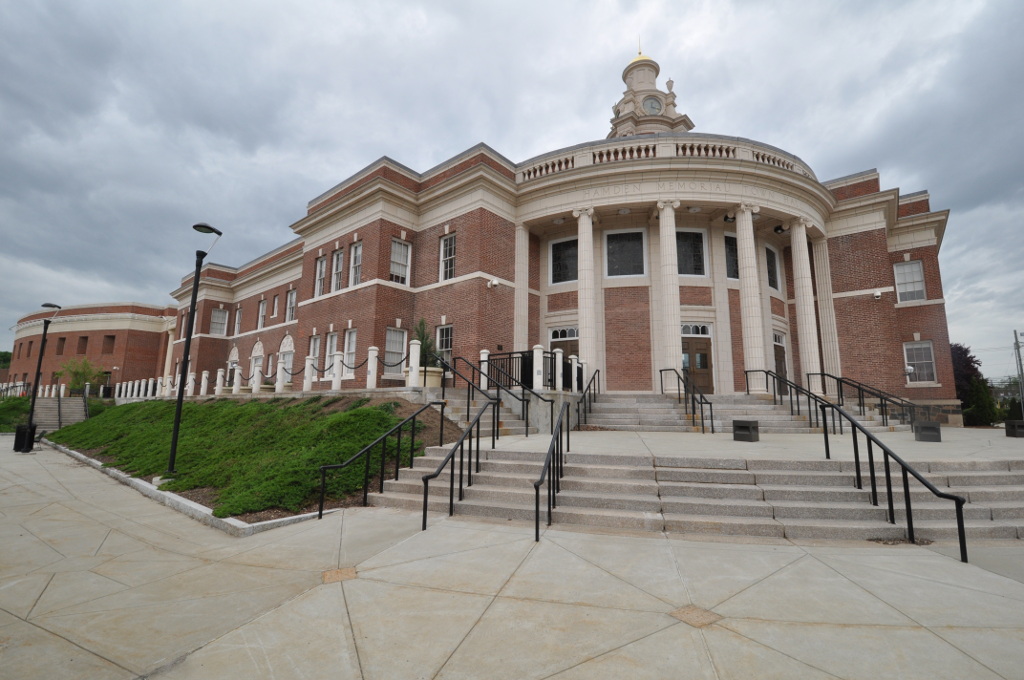
Wikimedia Commons
Tensions ran high as around one hundred activists, students and residents from the greater New Haven area protested the Hamden Police Department in the cavernous Hamden Town Hall on Wednesday night.
Participants protested the continued employment of a Hamden police officer who shot two unarmed New Haven residents in April. The status of the officer, Devin Eaton, was not listed on the agenda — a major source of contention for activists — and Eaton is currently on unpaid leave despite facing criminal charges after an investigation by the state. Frustrated protestors included multiple groups from Hamden, New Haven and Yale, such as Hamden Action Now, Black Lives Matter New Haven and Black Students for Disarmament at Yale. The protestors took up the microphone and gave heated speeches in the public comment section of the Hamden Police Commission meeting on Wednesday, looking to stall the meeting for as long as possible and block the commission from continuing with their agenda.
Wednesday’s protest is the most recent in a series of protests and is a continuation of activism that began in April. These started after Eaton and Yale Police Department officer Terrance Pollock shot several rounds at Stephanie Washington and Paul Witherspoon, who were unarmed and riding in a car in New Haven’s Newhallville neighborhood. Last month, State’s Attorney Patrick Griffin released a report charging Eaton with one count of assault in the first degree and two counts of reckless endangerment. Following the release of this report, protests have revived and swept both New Haven and Hamden. Protestors continued to demand the immediate termination of both Eaton and Pollock, more transparency and responsiveness to complaints from the commission and limitations on the jurisdiction of police departments.
“You are not shielded from this issue of police violence and police murder,” Kerry Ellington, a longtime community organizer, told the commission. “You have the power to act. The felony charges presented against officer Eaton provide adequate evidence and just cause to discharge him now, and it did yesterday, and it did months ago.”
Ellington also turned to the crowd and pointed out the irony of undercover police officers in attendance. She denounced the commission’s concern for their own safety, while saying that they showed no concern for Washington and Witherspoon’s safety on April 16.
While Griffin released the state’s report and charging recommendations on Oct. 21, the Hamden Police Commission has stated that it will wait for Acting Hamden Police Chief John Cappiello to conduct an internal investigation into Eaton’s actions and then make a recommendation to the commission. At the end of the meeting, the commission confirmed that Cappiello would make the charging recommendation by Nov. 20, and hearings would follow within 30 days.
However, activists still expressed deep frustration and anger at the lengthy process, claiming that the police commission could have conducted an internal investigation in concurrence with the State’s investigation. In addition, protestors cited the Hamden Town Charter, a document that gives the police commission the authority to remove officers, and the Police Union Contract, which states that the commission can discharge an officer with just cause. Speakers claimed that the commission thus had the power to terminate Eaton at any point.
“I feel enraged that it’s taken this long for the commission to be minimally receptive,” Ellington told the News in an interview. “We shouldn’t be pleading to the police commission to put a near attempted murder by their police officers on their agenda. We’ve seen the state turn a blind eye to these killings.”
Protestors also condemned the Hamden Police Commission as a whole and questioned its function and legitimacy. The commission is chaired by Michael Iezzi, and according to its website, is an intermediary body between the mayor and the chief of police regarding police department affairs.
Jeannia Fu, an activist from the Connecticut Bail Fund, accused the commission of covering up instances of police brutality. She cited the death of Jarelle Gibbs, a man who was killed in a car chase with the Hamden police last August. The driver, Brandon Shealy, was charged with manslaughter for Gibbs’ death, while no charges were levelled against the Hamden police.
“There is no such thing as a good police commission, just like there’s no such thing as a good police officer,” Fu said.
Yale student speakers also lashed out against the commission.
Many criticized their inattentiveness and demanded commissioners to put their phones away, make eye contact, stop staring at the clock and take some notes.
The evening reached a boiling point when Ben Dormus ’21, a member of Black Students for Disarmament at Yale, pointed out items on the committee agenda — what he called “petty cash” and “animal control” — and said the commission was “not as much of a police commission, but the social planning committee for the police department”.
While the commissioners had remained largely silent throughout the meeting, Iezzi responded by telling speakers not to insult the commission, prompting widespread commotion and shouting from both the Iezzi and the crowd.
On Nov. 6, activists protested outside Hamden Mayor Kurt Leng’s home. In a Facebook post, Leng said bringing a protest to a “public official’s private home, in my humble opinion, isn’t the best practice” and cited disturbance to his family and neighborhood.
Activists responded on Wednesday by saying that city officials showed no regard for the trauma and disturbance caused to Washington and Witherspoon as well as their families.
“I hear the frustration and understand,” Leng told the News on Wednesday night. “What I can assure everyone as our town’s mayor is that our police chief and police commission will handle this process in the very serious manner in which it deserves.”
The next Hamden Police Commission meeting is scheduled for Dec. 11.
Meera Shoaib | meera.shoaib@yale.edu
Interested in getting more news about New Haven? Join our newsletter!







